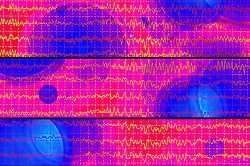Discovery of an epilepsy gene network offers hope for new treatments
Published in the journal ‘Genome Biology’ and led from Imperial College London, the study details an ‘epileptic network’ of 320 genes, called M30 that is associated with epilepsy. The genes in the network are thought to be involved in how brain cells communicate with each other. The results from the study suggest that when this network malfunctions, it triggers epilepsy. The research team believes that finding medications that restore this network could provide innovative new treatments to the debilitating disorder. Indeed, the discovery should provide a new boost for epilepsy drug research as many pharmaceutical companies have halted their research into finding new medications for the condition. ‘Epilepsy is one of the most common serious neurological diseases worldwide,’ commented senior author Professor Michael Johnson. ‘Yet despite almost 30 different drugs licensed for the condition, a third of people with epilepsy continue to suffer from uncontrolled epileptic seizures – despite taking medication. In fact, very little progress in finding effective drugs for epilepsy has been made in the past 100 years.’ The study notes that the gene network seems to malfunction in epilepsy caused by genetic causes, as well as epilepsy triggered by brain injury, such as following a stroke, tumours or infection. The condition can cause a range of symptoms, from an odd sensation or trance-like state to severe convulsions and loss of consciousness. 50 million people are thought to suffer from it worldwide, 6 million being in Europe according to the World Health Organisation (WHO). During the research, the research team, which was in collaboration with Duke-NUS Medical School in Singapore, used computational techniques to scan thousands of genes and mutations associated with epilepsy. They also looked at data from healthy brains, to identify networks of genes that seem to work together, and were associated with the disease. To confirm their finding that malfunctions in this gene network caused seizures, the team used additional data taken from mice. Finally, the team then computationally analysed 1 300 known to drugs to predict which ones could help restore the gene network to normal – one of the drugs found was a known epilepsy treatment called valproic acid. The study also pointed to many other drugs not previously considered as conventional anti-epilepsy medications. One of these was withaferin A, a compound derived from a plant known as Indian ginseng that has been used in Ayurvedic medicine for centuries to treat a range of diseases, including epilepsy. Professor Johnson added that the method used in this study, called ‘network biology’, where computer systems are used to identify gene networks that work together to underpin disease, may also provide opportunities for finding treatments for other conditions. ‘Until recently, we have been looking for individual genes associated with diseases, which drug companies then target with treatments,’ he explained. ‘However, we are increasingly aware that genes don’t work in isolation, identifying groups of genes that work together, and then targeting these networks of genes, may lead to more effective treatments. Our proof of concept study suggests this network biology approach could help us identify new medications for epilepsy, and the methods can be applied to other diseases. Funding for the study was part provided by the EPITARGET and IGENEE projects, themselves funded under FP7. Whilst the IGENEE project, coordinated from Imperial College London, officially ended in August 2016, the EPITARGET project will continue until October 2018. For more information, please see: EPITARGET website IGENEE project page on CORDIS
Countries
Sweden, United Kingdom



